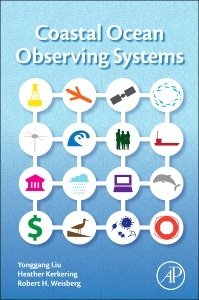Coastal Ocean Observing Systems
Coordonnateurs : Liu Yonggang, Kerkering Heather, Weisberg Robert H.

Coastal Ocean Observing Systems provides state-of-the-art scientific and technological knowledge in coastal ocean observing systems, along with guidance on establishing, restructuring, and improving similar systems. The book is intended to help oceanographers understand, identify, and recognize how oceanographic research feeds into the various designs of ocean observing systems. In addition, readers will learn how ocean observing systems are defined and how each system operates in relation to its geographical, environmental, and political region.
The book provides further insights into all of these problem areas, offering lessons learned and results from the types of research sponsored and utilized by ocean observing systems and the types of research design and experiments conducted by professionals specializing in ocean research and affiliated with observing systems.
Preface
1. Introduction to Coastal Ocean Observing Systems: Advances and Syntheses
2. National Ocean Observing Systems in a Global Context
3. The Importance of Federal and Regional Partnerships in Coastal Observing
4. Basic Tenets for Coastal Ocean Ecosystems Monitoring
5. The Monitoring of Harmful Algal Blooms through Ocean Observing: The Development of the Caifornia Harmful Algae Bloom Monitoring and Alert Program
6. Sustained Ocean Observing Along the Coast of Southeastern Australia: NSW-IMOS 2007-2014
7. Projeto Azul: Operational Ocean Observation and Forecasts in an Active Oil and Gas area of Southeastern Brazil
8. Zooplankton Data from High-Frequency Coastal Transects: Enriching the Contributions of Ocean Observing Systems to Ecosystem-based Management in the Northern California Current
9. The IMOS Ocean Radar Facility, ACORN
10. How Are High Resolution Wave Observations and HF Radar Derived Surface Currents Critical to Decision-Making for Maritime Operations?
11. Observing Frontal Instabilities of the Florida Current Using High Frequency Radar
12. Fine Scale Tidal and Subtidal Variability of an Upwelling Influenced Bay as Measured by the Mexican High Frequency Radar Observing System
13. Effect of Radio Frequency Interference (RFI) Noise Energy on WERA Performance Using the "Listen Before Talk" Adaptive Noise Procedure on the West Florida Shelf
14. Ocean Remote Sensing Using X-band Shipborne Nautical Radar - Applications in Eastern Canada
15. Estimating Nearshore Bathymetry from X-band Radar Data
16. Wind, Wave and Current retrieval utilizing X-Band Marine Radars
17. Glider Salinity Correction for Unpumped CTD Sensors Across a Sharp Thermocline
18. Sensors for Ocean Observing: The Optical Phytoplankton Discriminator
19. Observing System Impacts on Estimates of California Current Transport
20. Assimilation of HF Radar Observations in the Chesapeake-Delaware Bay Using the Navy Coastal Ocean Model (NCOM) and the Four Dimensional Variational (4DVAR) Method
21. System-Wide Monitoring Program of the National Estuarine Research Reserve System: Research to Address Coastal Management Issues
22. Integrating Environmental Monitoring and Observing Systems in Support of Science to Inform Decision Making: Case Studies for the Southeast
23. One System, Many Societal Benefits: An Efficient, Cost-effective Ocean Observing System for the Gulf of Mexico
Heather Kerkering is the Director of the Pacific Islands Ocean Observing System (PacIOOS), overseeing operations of the largest region in the U.S. Integrated Ocean Observing System (IOOS). Ms. Kerkering holds a Masters in Environmental Management from Duke University and a B.A. in Environmental Science from the University of Virginia. In 2005, she launched the Central and Northern California Ocean Observing System (CeNCOOS) at the Monterey Bay Aquarium Research Institute. In her decade with ocean observing systems, she has participated in numerous regional, national, and international initiatives. She has been an active Board member of the IOOS Association since 2005.
Dr. Robert H. Weisberg is a physical oceanographer engaged in ocean circulation and ocean atmosphere interaction studies in the tropics, on continental shelves, and in estuaries. His research presently emphasizes the West Florida Shelf and the interactions that occur between the shelf and the deep ocean and between the shelf and the estuaries. Through his Ocean Circulation Group he maintains a coordinated program of real-time, in-situ measurements, analyses, and numerical circulation models aimed at describing and understanding the processes that determine WFS water properties. Applications include harmful algal blooms
- Includes international contributions from individuals working in academia, management, and industry
- Showcases the application of science and technology in coastal observing systems
- Highlights lessons learned on partnerships, governance structure, data management, and stakeholder relationships required for successful implementation
- Provides insight into how ocean research transfers to application and societal benefit
Date de parution : 07-2015
Ouvrage de 490 p.
15x22.8 cm



